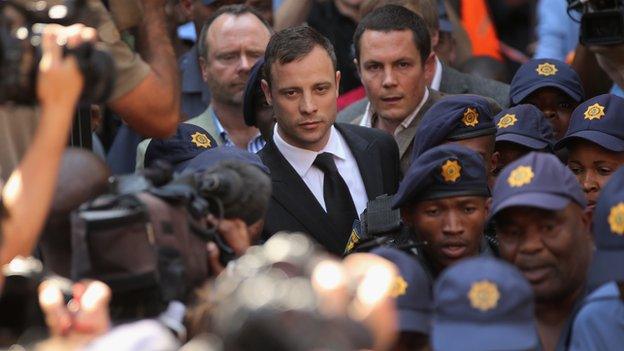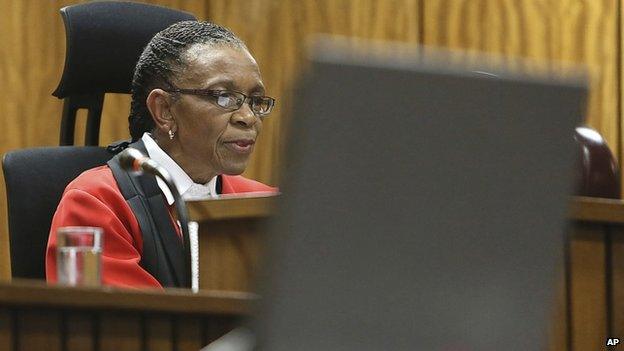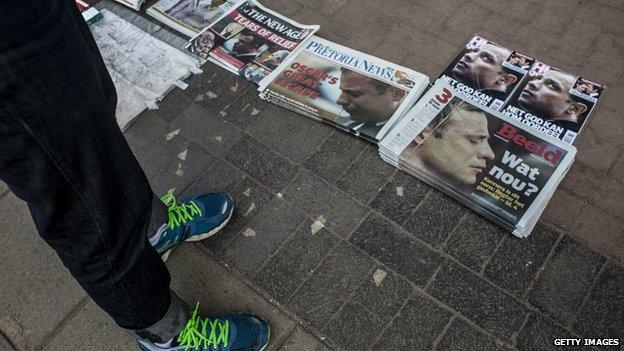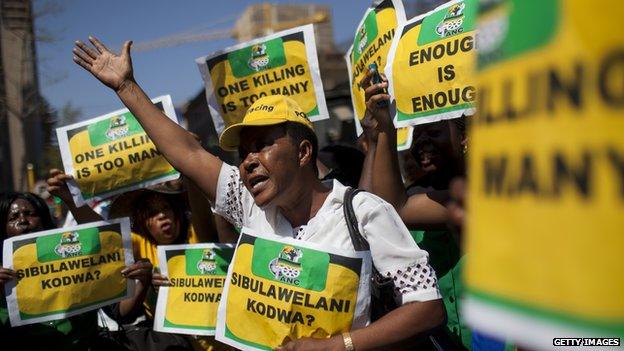Pistorius trial: South Africans still looking for finality
- Published

It was not the ending many here had either hoped for or anticipated. Oscar Pistorius is neither guilty of murder, nor innocent of any wrongdoing.
It's not exactly a legal fudge. But it lacks the finality so many trial watchers seemed to crave.
Today, some South Africans are genuinely angry about the verdict - convinced the athlete was guilty of pre-meditated murder - while others seem more like frustrated sports fans heading home after watching a long, goalless draw.
Narrow gap
There is still, of course, the crucial matter of sentencing - and the very real possibility that Judge Thokosile Masipa will seek to make an example of a man whom, until now, she has favoured with a generous portion of reasonable doubt.
In the meantime, the legal pundits here - many of whom confidently predicted a murder verdict - are now either bitterly accusing the judge of not understanding the law, or polishing their knives in preparation for any appeal.
The gap between a murder verdict and culpable homicide is obviously a narrow and at least partially subjective one, and I can't pretend to be an expert.
But Judge Masipa's brisk verdict struck me as masterful. Two things stood out.

Judge Masipa's verdict has split public opinion and legal experts alike
First was the succinct manner in which she stripped away the conjecture and the flab that had attached itself to the trial, swatting away much of the prosecution's circumstantial evidence and bringing the issue of reasonable doubt back to the fore.
It was, as she kept reminding the court, up to the prosecution to prove its case, or to show that Pistorius's own version could not reasonably, possibly, be true.
As I've written many times here, with only one eyewitness, and with the contradictory testimony of neighbours proving very little, this trial was always going to hinge on Pistorius's own evidence, and the prosecution consistently struggled to articulate an alternative timeline or version.
Prosecutor Gerrie Nel was a master of the cross-examination - exposing the athlete's wobbly, self-serving explanations. But that clearly wasn't enough for the judge.
The second thing that struck me about Judge Masipa's verdict was how human she was in her reasoning. Some judges can seem almost robotic in their meticulous interpretations of the law - like scholars poring over their books looking for excuses to close their ears, rather than engaging with the realities of a convoluted, contradictory world.
But Judge Masipa really listened. She accepted people's errors - and sometimes even their lies - as part of human nature and complexity, rather than a reason to stop listening.
Which brings me back to her verdict.
No great revelations
Ever since I raced up to Oscar Pistorius's estate on 14 February last year, I've been struck by how polarised and absolute people are about what they think they know happened.
Some email me insisting no woman would ever take a cell phone into a toilet at night, or lock the door - conveniently forgetting that Reeva Steenkamp might have locked it when she heard the screams, not when she first went in.

The trial, which began in March, has attracted worldwide media attention

It is tempting to draw out big themes from events like this
Others say it's inconceivable that a man wouldn't check where his partner was before rushing to confront an intruder - ignoring the possibility that a disabled man, hearing a noise in the next room, rather than, say, in his garden, might react in a less than considered manner.
Pistorius - the crowds insist - must be either a cold-blooded, ruthless killer or a vulnerable, tragic wretch.
And yet the evidence suggests a middle path and Judge Masipa has dutifully followed it.
It's tempting to draw out big themes from events like this - about crime and race in South Africa, violence against women, the implications of disability and so on.
Fair enough.
But this case has not been easy to pigeonhole, and what strikes me more today is what this trial does not reveal about modern South Africa.
For a start, it clearly wasn't proof that a rich and famous man can buy his way out of trouble here. Pistorius had an expensive legal team, but their experts struck me as no more competent than the state's.
And if he was exhaustively coached to say the right things in the witness box under cross-examination, then he clearly wasn't much of a student. It's a debatable point, but overall I'd say his celebrity has probably counted against him.

The case sparked national debate in South Africa on a range of issues, including domestic abuse and gun control
Nor was the trial proof that South Africa's legal system is in particularly good, or bad, shape. It may, as I discussed here, have profound impacts regarding cameras in courtrooms. But it's hard to reach broader conclusions from a one-of-a-kind case.
It merely proves what most already knew - that this country has some brilliant legal minds, some relatively weak interpreters, and some very professional and some very incompetent police.
This wasn't a watershed moment in race relations either. The sight of a black woman judging a white man may still startle some - and inspire many more - a generation after the demise of racial apartheid. But these days most South Africans seem to take such things in their stride.
The trial simply reminded us all how much things have changed since the arrival of democracy in 1994.
Ultimately this was a celebrity murder trial - a broad canvas on which to paint our own prejudices and opinions - and the fall from grace of a very special local hero.
We'll be in a better position to put it all in context after Judge Masipa has passed sentence on Oscar Pistorius. For now, the prospect of forgiveness and redemption seems a long way off.